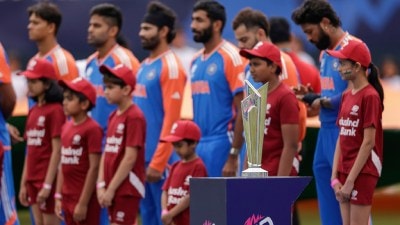Stay updated with the latest - Click here to follow us on Instagram
Tunes From The Dunes
Lakha Khan from the Thar,and Madou Diabate from the Sahara,brought together the music of their desert homes to the Capital.
On a nippy Saturday evening,tunes of two deserts far away from each other Sahara and Thar came together in the green room of Siri Fort auditorium. While the Manganiyars from Jodhpur,dressed in white dhoti-kurta,played the dholak,morchang and khartal,Mali-based musician Madou Diabate,in a green boubou (traditional Mali costume) played the kora,a 21-string bridge harp. Madou speaks French; Mangey Khan,one of the Manganiyars,speaks Hindi. So,they spoke through music creating an impromptu jugalbandi in which the morchang sounded naughty,almost teasing,and the kora responded through soothing,serene notes. Watching the show was a star musician,Sindhi Sarangi player,Lakha Khan.
Khan,one of the last few Sindhi Sarangi players in India,was in Delhi to perform at the Amarrass Desert Music Festival,held on Saturday and Sunday,and organised by Delhi-based label,Amarrass Records. The 27-stringed Sindhi Sarangi held against his body,the 62-year-old shut his eyes and his agile fingers began to pluck at the strings of their own accord. His rustic voice began to soar,transporting the audience to a desert kingdom.
My father and his father and his father used to play this instrument. Now,no one has the patience to learn this instrument,its tough,and no on has the time to teach, says Khan,a recipient of the Sangeet Natak Akademi Award.
Khan says the learning process began when he was barely 14 years old and continues to date. People need to understand that this instrument needs encouragement. Lekin kala jaagrut karne mein kharcha lagega. I enjoy playing at events such as these, Khan adds.
Like the Manganiyars and Khan,Madou Diabate has has several generations of musicians on his family tree. The kora is very special to me,it tells the story of my family and,in a way narrates who I am and what I have become, he says,about the large harp-like instrument. On stage,Diabate sits on a stool,adjusts the mike and flirts with the strings of the kora. The 71st generation of kora players,this is his first visit to India. The kora is an instrument that has the ability to surprise,thanks to the number of strings.
As Diabate begins playing his fathers compositions,the range of sounds that his fingers create through the kora turn the audience silent. Its as if 10 instruments are at play,all at once. The sound tickles you and takes you on an unexpected musical journey as it touches many chords and produces many sounds.
In India for another week,Diabates excitement knows no bounds as he talks about visiting Agra and seeing the Taj Mahal.
The jam session in the green room has thrilled him,and he says,Music is the language common between me and the Indian folk artistes.
They dont need to know French and I dont need to know any Indian languages to understand what they are saying.







